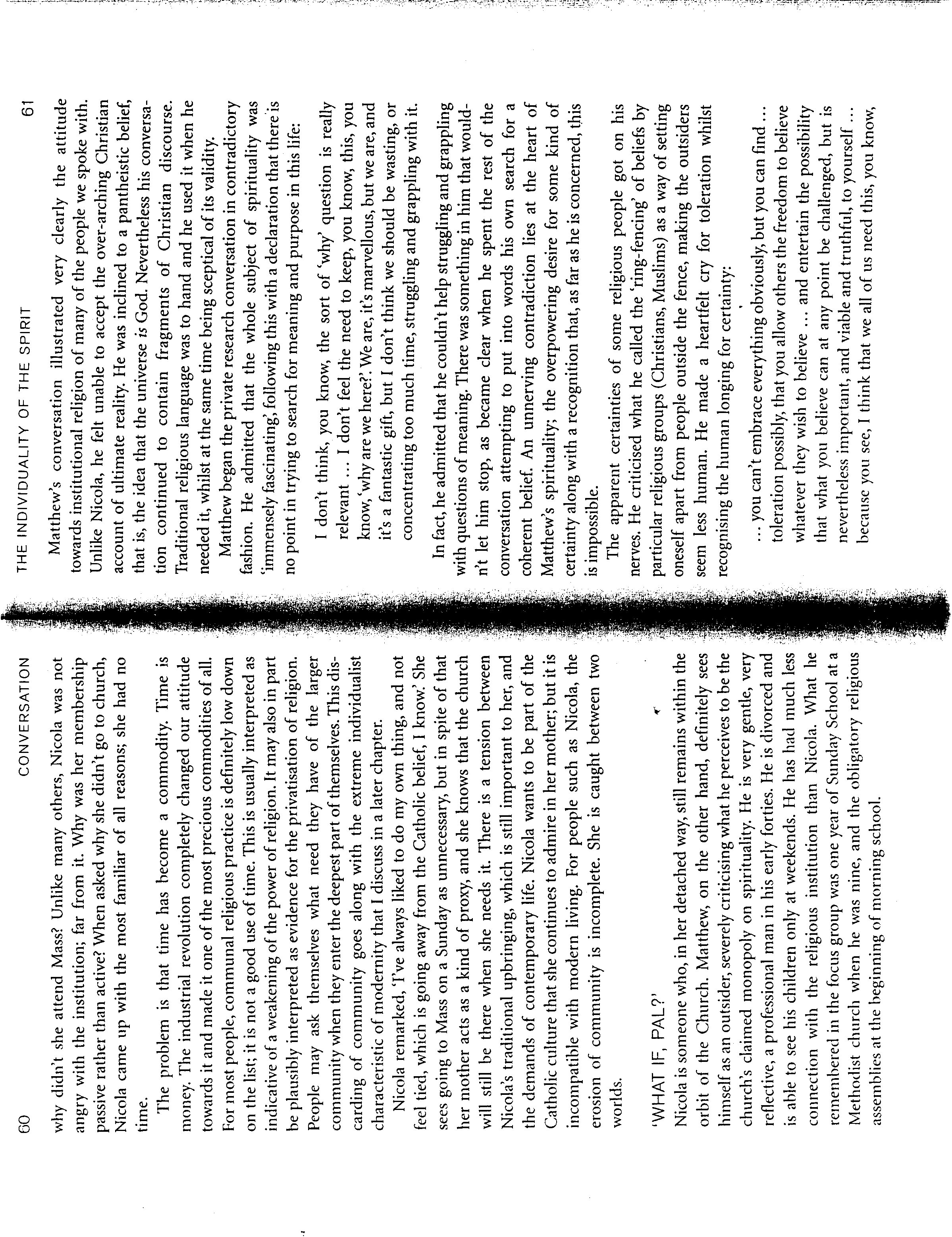ScannedImage 5

00 CONVERSATION
why didn’t she attend Mass? Unlike many others, Nicola was not angry witli the institution; far from it. Why was her membership passive ratlier than active? When asked why she didnt go to church, Nicola came up with the most familiar of all reasons; she had no time.
The problem is that time has become a commodity. Time is money. The industrial revolution completely changed our attitude towards it and madę it one of the most precious commodities of all.
For most people, communal religious practice is definitely Iow down on the list; it is not a good use of time. This is usually interpreted as indicative of a weakening of the power of religion. It may also in part be plausibly interpreted as evidence for the privatisation of religion. People may ask themselves what need they have of the larger community when they enter the deepest part of themselves. This dis-carding of community goes along with the extreme individualist characteristic of modernity that I discuss in a later chapter.
Nicola remarked, Tve always liked to do my own thing, and not feel tied, which is going away from the Catholic belief, I know.’ She sees going to Mass on a Sunday as unnecessary, but in spite of that her mother acts as a kind of proxy, and she knows that the church will still be there when she needs it. There is a tension between . Nicolas traditional upbringing, which is still important to her, and the demands of contemporary life. Nicola wants to be part of the . Catholic culture that she continues to admire in her mother; but it is incompatible with modern living. For people such as Nicola, the | erosion of community is incomplete. She is caught between two ; worlds.
i
'WHAT IF, PAL?’ «■ i
Nicola is someone who, in her detached way, still remains within the orbit of the Church. Matthew, on the other hand, definitely sees j himself as an outsider, severely criticising what he perceives to be the i churchs claimed monopoly on spirituality. He is very gentle, very j reflective, a professional man in his early forties. He is divorced and ^ is able to see his children only at weekends. He has had much less :| connection with the religious institution than Nicola. What he jj remembered in the focus group was one year of Sunday School at a j Methodist church when he was nine, and the obligatory religious ? assemblies at the beginning of morning school.
Matthews conversation illustrated very clearly the attitude towards institutional religion of many of the people we spoke with. Unlike Nicola, he felt unable to accept the over-arching Christian account of ultimate reality. He was inclined to a pantheistic belief, that is, the idea that the universe is God. Nevertheless his conversa-tion continued to contain fragments of Christian discourse. Traditional religious language was to hand and he used it when he needed it, whilst at the same time being sceptical of its validity.
Matthew began the private research conversation in contradictory fashion. He admitted that the whole subject of spirituality was ‘immensely fascinating’, following this with a declaration that there is no point in trying to search for meaning and purpose in this life:
I don’t think, you know, the sort of ‘why’ question is really relevant ... I don’t feel the need to keep, you know, this, you know, ‘why are we here?’. We are, it’s marvellous, but we are, and its a fantastic gift, but I don’t think we should be wasting, or concentrating too much time, struggling and grappling with it.
In fact, he admitted that he couldnt help struggling and grappling with questions of meaning. There was something in him that would-n’t let him stop, as became elear when he spent the rest of the conversation attempting to put into words his own search for a coherent belief. An unnerving contradiction lies at the heart of Matthew’s spirituality; the overpowering desire for some kind of certainty along with a recognition that, as far as he is concerned, this is impossible.
The apparent certainties of some religious people got on his nerves. He criticised what he called the ‘ring-fencing’ of beliefs by particular religious groups (Christians, Muslims) as a way of setting oneself apart from people outside the fence, making the outsiders seem less human. He madę a heartfelt ery for toleration whilst recognising the human longing for certainty:
... you can’t embrace everything obviously, but you can find ... toleration possibly, that you allow others the freedom to believe whatever they wish to believe ... and entertain the possibility that what you believe can at any point be challenged, but is nevertheless important, and viable and truthful, to yourself ... becausc you see, I think that we all of us need this, you know,
Wyszukiwarka
Podobne podstrony:
ScannedImage 5 00 CONVERSATION why didn’t she attend Mass? Unlike many others, Nicola was not angry
File0040 Listening 1 tfcSB Listen to the conversation. Why didn 1 loanna see
65711 ScannedImage 2 54 CONVERSATION much as it revealed. I could almost repeat by heart the formula
73386 ScannedImage 8 66 CONVERSATION fire, burned down the same side of his body. Tom had also tried
ScannedImage 6 62 CONVERSATION we need to cling on to certain private certainties, and ... certainti
ScannedImage 9 68 CONVERSATION freely, and talking about a religious experience? I he issue seems to
ScannedImage 3 56 CONVERSATION be alert to these effects. Our aim was to discóver peoples personal u
59864 zdj Ľcie0306 O will be i) • wim A) ar* gmng to *wim OTrtHMta* TT 21. YaKrda
więcej podobnych podstron